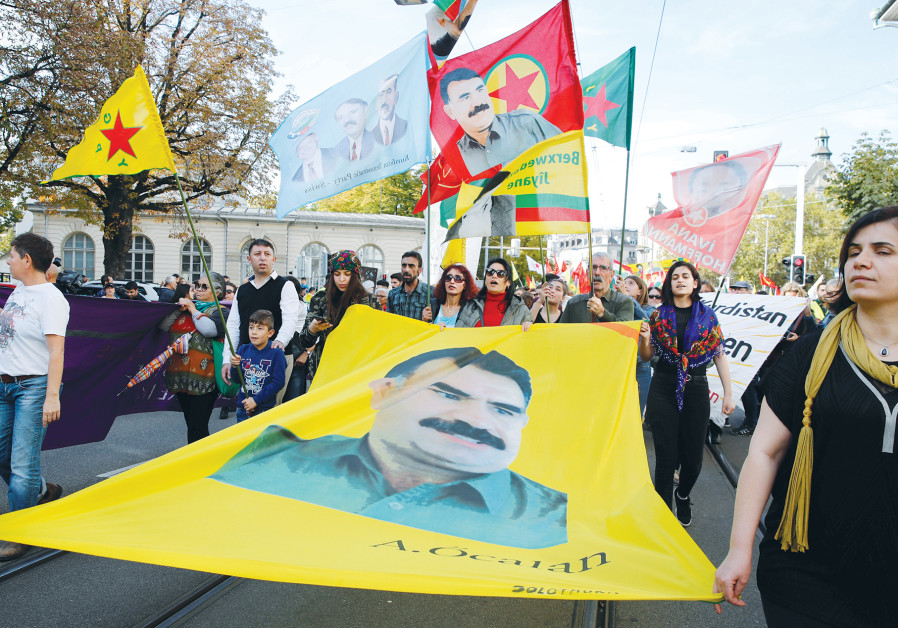Middle Israel: What are the Kurds doing wrong?
Faced with their most recent abandonment, Kurdish nationalists must first ask themselves why they are repeatedly betrayed, and then draw several lessons from Zionist history.

‘Let every nation know,” vowed John Kennedy in his inaugural address, “that we shall pay any price, bear any burden, meet any hardship, support any friend, oppose any foe to assure the survival and the success of liberty.”
Donald Trump’s amendment of this brave statement – “every nation except the Kurds” – is obviously a disgrace, but lamenting his betrayal can be no substitute for the introspection in which the Kurds must engage, and which Zionist experience can inform.
Faced with their most recent abandonment, Kurdish nationalists must first ask themselves why they are repeatedly betrayed, and then draw several lessons from Zionist history.
BETRAYAL HAS been a fixture of Kurdish life for a century. Their first betrayers were the European powers that promised Kurdish statehood in the 1920 Treaty of Sèvres, only to abandon this commitment in the 1923 Treaty of Lausanne.
Then came the Soviets, who backed the Kurdish Republic of Mahabad which existed in northwestern Iran in 1946, until the Red Army withdrew from Iran and abandoned its Kurds to their devices.
Then came Iran, whose shah first encouraged the Kurds’ revolt in Iraq in the 1970s, but abandoned them in 1975 to Saddam Hussein’s fury, in return for territorial concessions over the Shatt al-Arab waterway.
Then came the US, whose betrayal of the Kurds began not with Trump but with George H.W. Bush, in 1991, when he encouraged Iraq’s Kurds to confront Saddam, only to stand by when Saddam quelled their revolt.
That such geopolitical misfortune keeps befalling the Kurds is puzzling enough, but it is altogether mind-boggling considering the assets they possess.
The Kurds are big, numbering some 40 million people scattered contiguously along a landmass the size of Japan, which connects Turkey, Syria, Iraq and Iran. Ethnically non-Arab, the Kurds speak their own language and take pride in literature that harks back centuries.
In others words, the Kurds deserve national determination no less than the French, the Saudis and the Vietnamese, especially at a time when Lilliputian nationalities like Estonia, Kosovo and East Timor have their own states.
Yes, the Kurds did obtain one autonomous region, in northern Iraq, in the wake of last decade’s removal of Hussein. However, the autonomy, which is roughly the size of Maryland and is home to less than one-fifth of all Kurds, has failed to capitalize on this decade’s upheaval across the Arab world. In fact, it did the opposite of that – and that is where Zionist history’s first lesson to Kurdistan’s freedom fighters comes in.
THE FIRST thing Zionism struggled to do was to unite the Jews.
The congress that launched the Zionist project was but the beginning of a Sisyphean effort that was fiercely opposed by most of the day’s rabbis, both ultra-Orthodox and Reform, who were joined in this by communists, socialists, Bundists and Yiddishists.
It took decades, but by the time Zionist leaders decided to declare statehood, they were supported by almost every Jew in the world. Without that massive support, the Jewish state might have never been born.
The Kurds today are even more disjointed than the Jews were in the days of Theodor Herzl. Their rifts surfaced most tragically two years ago, when the Kurdish autonomy held an independence referendum while split between then-president Masoud Barzani and his rival, Bafel Talabani.
Barzani claimed 93% voted “yes,” but his failure to harness a major Kurdish leader’s support before making such a major gamble proved fatal. Detecting and also exploiting Kurdish disunity, Iranian-backed Iraqi forces stormed oil-rich Kirkuk, snatched more than a third of the Kurdish autonomy’s territory, and seized much of the oil that was its main source of income.
When David Ben-Gurion faced in May 1948 a political and diplomatic dilemma much like Barzani’s in 2017, he made sure his declaration of independence would be signed by all, including representatives of his nemesis the Revisionist Party, as well as a rabbi who represented the ultra-Orthodox circles who originally opposed the Zionist idea.
So the first Zionist lesson to the Kurds is: unite. Not only within your autonomous region, but across your four lands, so that whatever any of your regions does or doesn’t do reflects the will of one leadership.
The second lesson is: find a statesman.
AS THINGS currently stand, the most famous Kurdish leader is Abdullah Ocalan. That’s bad for the Kurdish cause because his outfit, the Kurdish Workers Party, is defined as a terrorist organization by both Washington and Brussels. That is the equivalent of Menachem Begin leading the Jews in 1948.
The Kurdish cause needs one agreed leader who would be fully removed from political violence, and at the same time would also enjoy international admiration; the way Chaim Weizmann’s leadership of Zionism in the 1920s and 1930s was unchallenged from within, and saluted from without.
Finally, the Kurdish cause needs focus. The current situation is that multiple Kurdish groups are confronting four governments simultaneously and disjointedly. That will never work.
Military focus could have meant, for instance, avoiding the Syrian theater in order to enhance state-building in northern Iraq; or respecting Turkey’s demand in 2016 that Syria’s Kurds remain east of the Euphrates.
Political focus can mean rallying the free world to fight Turkey’s ban on Kurdish-speaking schools. Any humanist will have to back this, the way humanists opposed the British Navy’s blocking of Holocaust survivors landing at Zion’s shores.
All this is not to say that the Jews were particularly smart. Had they been real smart, they would have produced their state early enough to prevent the Holocaust.
The Kurds, fortunately, face no Hitler – and, unlike the Jews, they number 40 million, none of whom needs to be led home, because they already are home. All they need is better leadership.
